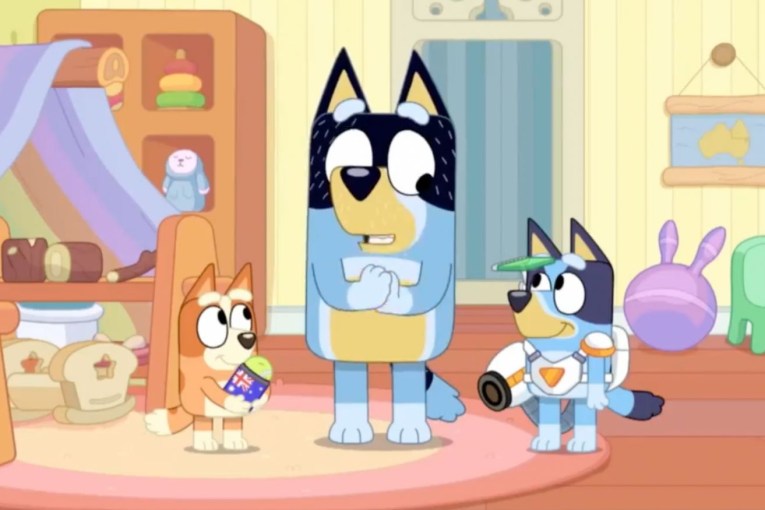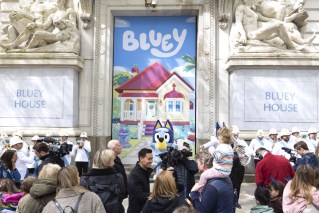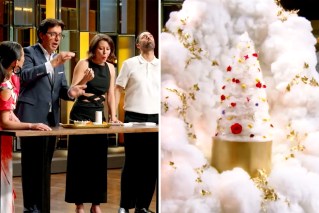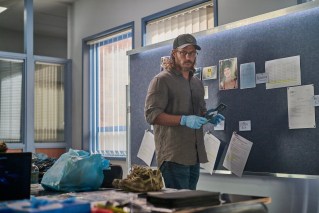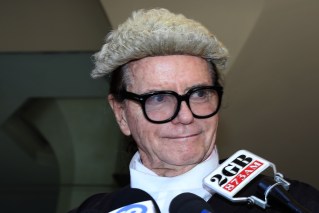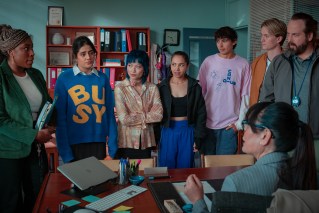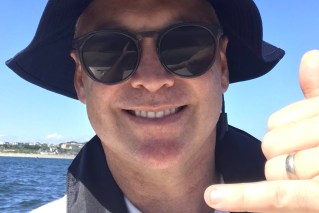Analogue TV moments: ‘Welcome to television’

“Good evening and welcome to television.” … Bruce Gyngell, Sydney, September 16, 1956
I suppose there’s a kind of philosophical question as to whether the greatest moment of something can include the moment of its coming into existence. Very few people choose to include in their Curriculum Vitae the moment of their conception; with the possible exception of Jesus of Nazareth and Simon Cowell.
In the case of Australian television, the moment of conception had been preceded by 20 anxious years of anticipatory foreplay: in the US, television had been demonstrated in July 1936 and NBC had been broadcasting news to New Yorkers since 1939.
On the day television did finally arrive, it sounded eerily familiar.
That first television broadcast — Bruce Gyngell September 16 in Sydney, Geoff Corke 10 days later in a Melbourne test broadcast, both announcers trapped and static beaming and stunned in the glare of the spotlight — were a couple of radio men enunciating perfectly in grainy synchronicity.
• Can’t see the video? View the story on a desktop browser instead.
Television was radio; radio with occasionally moving pictures. Most of the executives, all of the technicians and nearly all of the on-air talent were established radio men.
Television struggled in the first few months as it grabbed what was at hand and tried to squeeze the available local talent from radio, theatre and vaudeville into the new round hole of television.
Every day was a fantastical living experiment. Some of it worked. Some of it was appalling. At any given moment one could turn on the Radiola and after the valves had warmed up, hear the television greengrocer dissect the latest prices of local lemons and lettuces or watch the television dentist examine the mouth of a besuited patient from the blurry distance of a fixed pedastel camera several yards away.
Melbourne’s Opening Night of broadcast television is a case study in the daring tentative trepidation of those early days.
Officially broadcasting in Melbourne commenced on November 4, 1956 with the opening of Melbourne’s HSV7.
The night commenced at 7pm with a variety concert ambitiously broadcast from the recently refurbished Tivoli theatre and loosely modelled on Britain’s Sunday Night at the London Palladium.
The star of the variety concert was a visiting English comedian Richard “Mr Pastry” Hearne, so commencing an honoured Australian television tradition of displacing proven local talent in favour of dubious, desperate or impoverished foreign artistes. Apparently Mr Pastry was an old man with a walrus moustache who wore a bowler hat and a black raincoat and engaged in acrobatic sight gags. God knows what they were thinking. Years later, Richard Hearne would be approached by the BBC to play the part of the original Dr Who but indicated he would do so only if he could play Dr Who as Mr Pastry. The part of the Doctor was subsequently offered to John Pertwee; which was frankly a blow to all of those who would have paid a pretty penny to see Mr Pastry emerge from the Tardis to tackle a gaggle of belligerent Daleks.
This momentous night in 1956, Mr Pastry was joined on the stage of the Tiv by the Premier of Victoria, Henry Bolte, and the Lord Mayor of Melbourne. The Concert was scheduled to run for a mere 45 minutes and Bolte was a politician predisposed to speaking, so its unclear from the records whether Mr Pastry came anywhere near to unleashing the extended version of his trademark vocal “Pop Goes the Weasel”.
The official concert was followed by a live panel show, I’ve Got A Secret, in which a local Melbourne Celebrity Panel tried to guess the identity of a mystery guest.
It was clear, even on this first day of broadcasting, the term Celebrity Panel was as misused as it is today. The panellists bizarrely comprised former AFL footballer, policeman and local publican “Captain Blood” Jack Dyer and a lecturer in French from the University of Melbourne, Miss Olive Wykes.
I was too young to witness the show. Even given the earlier warm up of Mr Pastry, its hard to imagine the dialogue that flowed between Captain Blood, renowned as an on- field enforcer and for almost killing his Melbourne opponent in Round 15 1947, and Miss Wykes, renowned presumably for her French grammar, as they sought to identify their mystery guest.
• Introduction: The 57 greatest moments in 57 years of analogue TV
• Man walks on the moon
• Colour television introduced
• The America’s Cup
• September 11 terrorist attacks
Dyer was a great footballer and a remarkable man in many ways, but interrogation of celebrity strangers was not one of his noted strengths. Nor the use of the English language in general. Some of Dyer’s more memorable malapropisms include:
“I won’t say anything in case I say something.”
“Bamblett made a great debut last week, and an even better one today.”
“Mark Lee’s long arms reaching up like giant testicles.”
“It’s as dark out there as the Black Hole of Dakota.”
“Yes, we had an enjoyable time on the French Riverina.”
“The problem with young people is all they want to do is sit around and smoke marinara”.
And of course his memorable declaration that Fitzroy had “copulated to the opposition”.
Captain Blood and Miss Wykes had half an hour to extract the identity of the mystery guest. There are no records of the interrogation; but frankly, half an hour with Captain and Miss Wykes would have been the equivalent of televisual waterboarding and would have seen anyone confessing pretty much anything.
The Opening night of television concluded with a foreign show, Robin Hood, and a news cast read by Eric ( later Sir Eric) Pearce. The entire cornucopia came to an end at 10.30pm.
WH Auden would later observe of television “What the mass media offers is not popular art, but entertainment which is intended to be consumed like food, forgotten, and replaced by a new dish.”
Auden may have been right about consumption and replacement, but if he’d witnessed that first night of television in Melbourne he’d have realized that some media offerings, however disposable and no matter how much one might wish, can never, never be forgotten.
